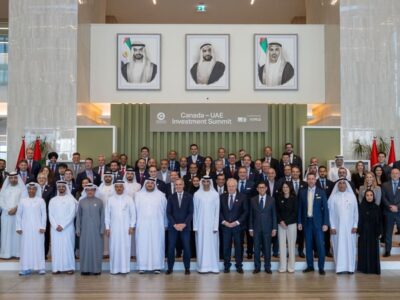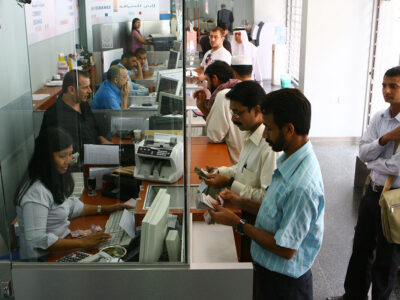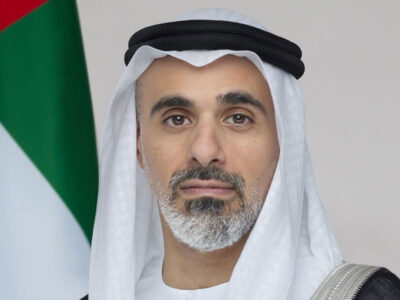The UAE has been named the Middle East’s most competitive country and is among the top 10 globally, according to new rankings that reflect the impact of the Covid-19 pandemic on economies around the world.
The International Institute for Management Development’s (IMD) World Competitiveness Ranking ranked the UAE ninth, ahead of Qatar (17th), Israel (27th) and Saudi Arabia (32nd), the other Middle East countries analysed among the 64 globally.
Switzerland came top for the first time in the 33-year history of the rankings, ahead of Sweden and Denmark in a shake-up that saw European economies weather the health crisis better than most other regions.
Completing the top five were the Netherlands and Singapore which took a tumble from the number one spot it had held for the previous two years.
The IMD World Competitiveness Ranking ranks 64 economies and assesses the extent to which a country promotes the prosperity of its people by measuring economic well-being through hard data and survey responses from executives.
This year the rankings exposed the economic impact of the pandemic across the globe. The report finds that qualities such as investment in innovation, digitalisation, welfare benefits and leadership resulting in social cohesion have helped economies better weather the crisis, allowing them to rank higher in competitiveness.

On the UAE’s ranking, Sheikh Mohammed bin Rashid Al Maktoum (pictured above), Prime Minister and Vice President of the UAE and Dubai Ruler, tweeted on Thursday: “Despite the pandemic, the UAE has advanced in 120 global indicators… We have topped the world in 20 development indicators and the UAE is among the top 10 countries in competitiveness and the 1st globally in the government’s ability to adapt to changes. We did not stand still during the pandemic and we will not stop moving forward.”
His comments come as the UAE has implemented a number of policies and initiatives aimed as supporting its economy and people amid the ongoing pandemic.
In January, the UAE approved amendments to its nationality laws to attract more foreign talent to contribute to the country’s “development journey”.
Specific categories can acquire Emirati citizenship including investors, doctors, specialists, inventors, scientists and individuals with creative talents such as intellectuals and artists.
The UAE also abolished the need for companies to have Emirati shareholders late last year, in a major shake-up of foreign ownership laws aimed at attracting investment into an economy reeling from the coronavirus and a decline in oil prices. This was implemented earlier this month.
In September, Dubai launched a retirement programme for resident expatriates and foreigners over the age of 55.
Retire in Dubai, the first of its kind in the region, is being spearheaded by Dubai Tourism in collaboration with the General Directorate of Residency and Foreigners Affairs.
Eligible applicants will be provided a retirement visa, renewable every five years. The retiree can choose between one of three financial requirements for eligibility: earning a monthly income of AED20,000 ($5,500); having savings of AED1 million ($275,000); or owning a property in Dubai worth AED2 million ($550,000).
In its initial phase, the programme will focus on UAE residents working in Dubai who have reached retirement age.
Dubai has also launched the Virtual Company Licence, which allows global businesses to access a regulated e-commerce platform populated by Dubai-based companies, while also exploring new markets and investment opportunities digitally.
The initiative, which allows investors worldwide to do business in Dubai digitally without having to live in the emirate, is expected to attract more than 100,000 companies.

According to the IMD World Competitiveness Ranking, one major trend revealed in this year’s results is that countries that had built themselves a certain economic buffer prior to the pandemic fared better, and that this was in spite of their infection levels.
Arturo Bris, director of the IMD World Competitiveness Centre and Professor of Finance, noted that the health crisis – while devastating – was temporary. Competitiveness measures longer-term impact.
“Although Switzerland was slow to fight the pandemic, it has not jeopardised its future economic growth because it has kept a disciplined financial strategy by not spending too much.”
Economic prowess in spite of infection levels is also seen in the positions of the United States, which maintained its foothold in 10th place, and the United Kingdom, which shuffled up one spot to 18th.
The UAE managed to retain its ninth spot in the rankings while Qatar slipped three places and Saudi Arabia fell by eight places compared to the previous index.
China ranked 16th, up from 20th last year.
“China, by continuing reducing poverty and boosting infrastructure and education strengthens the possibility of advancing in the rankings,” said Bris, adding: “Still, China does not rank among the top ten most competitive economies despite its size and GDP growth potential. But this is what competitiveness is about, prosperity, not necessarily growth.”
Overall, the team at the IMD World Competitiveness Centre noted the following trends around the world:
- Innovation is the bedrock of long-term performance, with education and other factors driving both a productive workforce and research.
- Digitally advanced economies that have seamlessly transitioned to “work-from-home” have thrived compared to their peers.
- The economies that provide government efficiency through a strong social safety net, including unemployment benefits, bounced back quicker.
- Health infrastructure also had an impact and is dominated by wealthy economies with a strong social net.








